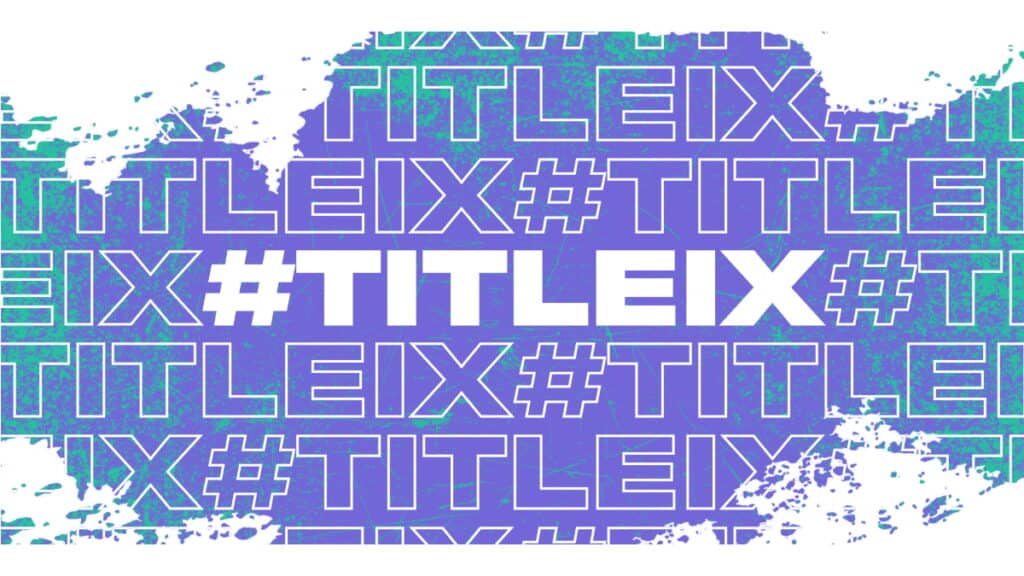When most people think of “Title IX” they tend to focus on the role on Title IX in preventing sexual or gender-based discrimination on college and university campuses.
Title IX is certainly concerned with this type of discrimination, but it’s also focused on preventing sexual assault and sexual misconduct on campuses too.
If a college or university fails to comply with the rules of Title IX, that college or university risks losing federal funding. Consequently, colleges and universities subject to Title IX have special “Title IX officers” who focus specifically on compliance with these rules and regulations. Title IX officers oversee an elaborate system which investigates allegations of sexual assault or sexual misconduct on campus. In this post, we’re going to go over these Title IX investigations (of sexual assault allegations) in detail.
When a college or university subject to Title IX receives a sexual assault complaint, there is a duty to conduct an independent investigation to assess the veracity of the claim. This investigation is wholly separate from any law enforcement or criminal investigation. In the coming sections, we will discuss the details of the Title IX investigation process, including the role of attorneys in the process, defense strategies, Title IX interrogations, standards of proof, and other related issues.
If you’ve been hit with a Title IX sexual assault or sexual misconduct allegation, the first thing you want to do is avoid panicking. Allegations of this kind can be quite frightening. The next thing you should do is obtain expert counsel, because navigating through these investigations can be very difficult. If things aren’t handled carefully, the consequences can be quite negative.
Learn More → Steps in a Title IX Defense Case in Maine: What You Need to Know
Call 207-571-8146 or contact us online to schedule a consult with one of our highly skilled criminal defense attorneys today.
Table of Contents
Standard of Proof: Criminal Investigation vs. Title IX Investigation
Title IX have numerous problems. From a variety of angles, they are somewhat unfair to accused persons. One of the things which accused persons should definitely be aware of is the standard of proof for both Title IX investigations and criminal investigations. In a criminal investigation for sexual assault, the standard of proof is high: the investigators must prove that the alleged sexual assault (i.e. the sexual contact, penetration, etc.) occurred, that there was no consent, and that the defendant was aware of this lack of consent (or should have been aware based on the evidence). All in all, this is a high bar to meet.
Title IX investigations, on the other hand, have a considerably lower standard: the standard in these investigations is “preponderance of the evidence,” which essentially means that the investigators must prove that the probability that the incident occurred is greater than 50%. This preponderance of the evidence standard is literally all the college or university needs to show to verify a complaint for the purposes of a Title IX investigation.
Title IX Officer Interrogations / Interviews
One aspect of Title IX investigations which can be tricky is the interrogation or interview phase conducted by the Title IX officer. For one thing, any statement given to a Title IX can be used in the college or university’s handling of its investigation, but can also be transferred over to law enforcement as well. This means that a statement given to a Title IX officer can be used as evidence in a criminal investigation. This can be a difficult situation to maneuver, particularly when we consider the fact that Title IX officers will often inform defendants that they have no Fifth Amendment privilege because Title IX investigations are internal administrative procedures rather than legal proceedings.
Defense attorneys are exceedingly helpful in this context, because attorneys can inform defendants about the potential ramifications of certain statements to Title IX officers. For example, if a student admits to having consensual intercourse with an alleged victim, this admission can possibly be enough to warrant an arrest for a criminal charge. This is true even though the underlying allegation which led to the Title IX investigation itself may be totally baseless. An arrest by itself doesn’t mean that the accused person will be convicted of a criminal charge, but an arrest is certainly a very negative consequence which can follow from an interrogation. An arrest can be emotionally draining and traumatic, and plus a public record is created which documents the incident.
Call 207-571-8146 or contact us online to schedule a consult with one of our highly skilled criminal defense attorneys today.
The College / Law Enforcement Connection
Another thing which readers should keep in mind is that, while colleges and universities are not required to automatically transfer over the results of a Title IX investigation to law enforcement, colleges and universities usually will transfer over results whenever law enforcement issues a subpoena for those results. So, although the results of a Title IX aren’t necessarily used in evidence in criminal investigations, accessing these results is typically quite simple for law enforcement. Furthermore, even if an alleged victim indicates that he or she doesn’t wish to press charges for the defendant’s behavior, colleges and universities will still retain the results of an investigation. This means that, if the alleged victim changes his or her mind about pursuing charges, the Title IX investigation results can still be accessed later on by law enforcement following a subpoena (assuming the statute of limitations doesn’t apply).
The Basic Steps in a Title IX Investigation
The procedure of Title IX investigations doesn’t come with too many surprises: the first step is that the alleged victim makes a formal complaint against the defendant. Next, the student accused of sexual assault will receive a “no contact” letter, which basically has the same effect as a temporary restraining order. The defendant is prohibited from having any sort of electronic or in person contact with the alleged victim – no text messaging, phone calls, or any other form of communication.
After this no contact letter, the defendant will then receive communication directly from the Title IX officer in charge of overseeing the investigation. Again, colleges and university subject to Title IX must launch an independent investigation, and so there is no possibility of avoiding one. The Title IX officer may the give some information about the investigation procedure to the defendant, but readers should know that this information won’t always be very helpful. Many Title IX officers will not, for instance, notify defendants about the gravity of their statements, and so many defendants won’t be aware that their statements can lead to a criminal conviction. Furthermore, many Title IX officers won’t tell defendants about the importance of procuring expert counsel.
If the standard of proof is met – which means that the underlying incident more likely than not occurred – then the college or university will issue a determination in the case and then decide punishment. The student can face a range of punishments, including expulsion from the institution altogether.
Call 207-571-8146 or contact us online to schedule a consult with one of our highly skilled criminal defense attorneys today.
Defense Strategies / Approaches
Criminal defense attorneys are placed in a very difficult position when it comes to developing strategies for defendants accused of sexual assault. On the one hand, the overriding priority should be to prevent the defendant from seeing jail time, but there are other priorities too. Obviously, students want to remain in school, and so preventing suspension or expulsion is also a top priority. Some defense attorneys may tell their clients to avoid making a statement under interrogation to a Title IX, while others may simply counsel clients to avoid making statements until they receive expert advice. Refusing to give any statement can lead to repercussions as well, and so this is something which defense attorneys need to highlight.
Defending against sexual assault allegations can difficult because of the subtle realities involved with these cases. For instance, in some cases, a defendant is accused of sexually assaulting a victim after the defendant and that alleged victim already engaged in consensual sexual activity. In other words, the alleged victim brings an accusation after he or she already engaged in consensual sexual activity with the alleged defendant. There have been several well-known examples of this phenomenon. For instance, in a recent case from the San Diego, California area, a defendant was accused of sexual assault, but the defendant engaged in consensual sex with the victim both before and after the alleged incident. The complainant formally admitted that the encounters before and after the incident were consensual. However, the university denied the evidence at its own investigative hearing, and so the accused person was eventually found guilty of sexual assault (in that case, “improper sexual touching”).
In many cases, Title IX sexual assault allegations have relatively little in the way of hard, concrete evidence. In fact, many of these cases involve a “he said, she said” type of situation, in which the investigation ultimately boils down to the defendant’s word against the victim’s word. Of course, this type of evidence is never sufficient to sustain a criminal conviction, but it can have negative ramifications in the context of the Title IX investigation. A good defense attorney will focus on poking holes in the case by digging up hard evidence. Defense attorneys conduct copious research when defending against accusations: witness interviews, physical evidence examinations, character evaluations, scenario reenactment, and so forth.
Call 207-571-8146 or contact us online to schedule a consult with one of our highly skilled criminal defense attorneys today.
The Realities of False Title IX Sexual Assault Accusations
Another point which readers should bear in mind is the fact that many Title IX sexual assault allegations are false. The allegations filed by complainants have been shown to be false in plenty of situations, and so it’s important for accused persons to avoid assuming that the case is over right from the outset. There are many reasons as to why these types of allegations have a relatively high chance of being false. One reason is simply because of how these cases come into being. Often, when people accuse others of sexual assault, they do so after consuming alcohol or other consciousness-altering substances, and those situations can easily lead to distorted remembrances. Furthermore, whenever there is consensual sexual activity occurring between students, there will always be a possibility of false accusations due to sexual guilt or remorse.
Some complainants make allegations because they simply don’t enjoy the way a particular event or situation unfolded. Or, the alleged victim could be concerned about his or her personal reputation within the campus community. This is yet another reason to hire a capable defense attorney when dealing with an allegation: false accusations can still cause problems if they aren’t exposed as false. Sometimes, when a false accusation isn’t exposed as false, that accusation can still lead to nasty consequences for the defendant, including expulsion.
Contact the Maine Criminal Defense Group for Additional Information
As we’ve seen, Title IX investigations are complex procedures which involve numerous steps and present all sorts of complicated issues. Certain of these issues, such as the implications of statements to Title IX officers, should be considered “essential information” for all Title IX defendants. Understanding Title IX investigations depends partly on knowing about the underlying goals of this piece of legislation. The primary goal of Title IX is to prevent sexual or gender discrimination, sexual misconduct and sexual assault. Because of this overarching consideration, the investigation process is perhaps a bit unfair or unfavorable to defendants, especially in certain ways.
Dealing with a sexual assault allegation alone is never a recommended practice. The potential consequences of Title IX investigations are very serious: suspension, expulsion, and ultimately jail time are possibilities. If you’ve been hit with an allegation, give the Maine Criminal Defense Group a call today at 207-571-8146 for an initial case evaluation.
Call 207-571-8146 or contact us online to schedule a consult with one of our highly skilled criminal defense attorneys today.
Blog Posts

Both prostitution and solicitation are considered sex crimes in Maine. Buying or selling sexual acts or sexual contact is illegal and has traditionally been considered a criminal offense for all[...]

A protection from abuse order (PFA) can make it illegal for an individual to contact you or your children in the state of Maine. Filing a PFA is often a[...]

In a recent child exploitation case from Boston, a Maine man was found guilty by the federal court and sentenced to 13 years in prison and five years of supervised[...]

Sexual assault crimes are among the most serious offenses a person can commit. Sexual assault crimes involving minors are even more serious; many people argue that sexual assault against minors[...]

Note: We do not do any sex registry work but we do handle all sex-related cases Sex crimes are among the most destructive, antisocial behaviors in our whole society. Everyone[...]

When people refer to “Title IX,” they are referring to the provisions of Title IX within the Education Amendments of 1972 (20 U.S.C. §§ 1681 et seq.). The purpose of[...]

All crime is a serious matter, but not all crimes come with the same level of severity. Few people would try to argue that a simple act of vandalism –[...]

Being accused of sexual misconduct in an educational environment in Maine can have serious ramifications for your future. As such, any accusation must be treated seriously. Even if you are[...]

Sexual assault cases in Maine may proceed as criminal or civil cases depending on the circumstances. In many criminal and civil cases, a statute of limitations applies. These are time[...]

In the past, we have tried to discuss statutory rape and statutory sexual assault crimes from various angles. One of our primary angles has been simply to outline the formal[...]


